Repetition is never a desirable goal in writing a weekly column, I suppose. But there are certain things I feel need to be reiterated after this week’s episode of Golden Kamuy, because there’s no other way to give this series its due:
- There is a huge gap between this series and any other anime currently airing. Among the widest I can ever remember.
- The tonal range this show possesses is utterly astonishing.
- A big part of the magic of Golden Kamuy is that it effectively has no supporting characters. Everyone in the main cast is the center of their own universe, and capable of being the main character and carrying the series at any given time.
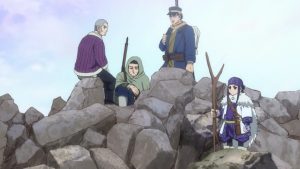 None of that is new information – I’ve said it all before, and recently too. But it doesn’t matter, because when you can do what this show does you deserve to have your praises sung to the heavens. Whether it’s a cacophony of spectacle and scope or a somber meditation on the tragic human journey, Golden Kamuy is equally at home. And it’s shown that in this superb second cour, which started out with one explosive epic after another and has now given us some of the most effective interior material of the series in the past two episodes.
None of that is new information – I’ve said it all before, and recently too. But it doesn’t matter, because when you can do what this show does you deserve to have your praises sung to the heavens. Whether it’s a cacophony of spectacle and scope or a somber meditation on the tragic human journey, Golden Kamuy is equally at home. And it’s shown that in this superb second cour, which started out with one explosive epic after another and has now given us some of the most effective interior material of the series in the past two episodes.
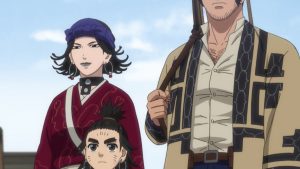 Any episode which revolves around Tanigaki is welcome, both because his arc has developed into one of the series’ most interesting and because he’s personally developed into one of its most nuanced characters. It would be wrong to say I liked him off the bat – the Matagi hunter obsessed with killing Retar was hardly a sympathetic figure. But this is Golden Kamuy – people change constantly (as happens in real life) and there’s always more to them that their initial impression would imply. Takagi’s time with Asirpa’s family has changed him, certainly, but he was a man receptive to that change – and this week we learn a good deal more about how he got that way.
Any episode which revolves around Tanigaki is welcome, both because his arc has developed into one of the series’ most interesting and because he’s personally developed into one of its most nuanced characters. It would be wrong to say I liked him off the bat – the Matagi hunter obsessed with killing Retar was hardly a sympathetic figure. But this is Golden Kamuy – people change constantly (as happens in real life) and there’s always more to them that their initial impression would imply. Takagi’s time with Asirpa’s family has changed him, certainly, but he was a man receptive to that change – and this week we learn a good deal more about how he got that way.
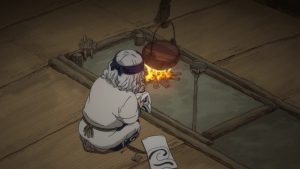 A troubling message from Asirpa’s uncle reaches Tanigaki’s party at the post office in the village of Hitomai. Asirpa’s grandmother Huci is making a Raikur Shiyuk, a burial shroud – something the elderly among the Ainu do in secret when they sense death is near. An Ainu’s children must perform a ritual to send them to the next world when they pass, and Huci has no children present. Tanigaki declares that he’s one of her children now, because she fed and cared for him (as he’s now caring for the orphan Ainu boy Cikapasi), and he resolves to find Asirpa and bring her home to cheer the old woman’s heart before it’s too late.
A troubling message from Asirpa’s uncle reaches Tanigaki’s party at the post office in the village of Hitomai. Asirpa’s grandmother Huci is making a Raikur Shiyuk, a burial shroud – something the elderly among the Ainu do in secret when they sense death is near. An Ainu’s children must perform a ritual to send them to the next world when they pass, and Huci has no children present. Tanigaki declares that he’s one of her children now, because she fed and cared for him (as he’s now caring for the orphan Ainu boy Cikapasi), and he resolves to find Asirpa and bring her home to cheer the old woman’s heart before it’s too late.
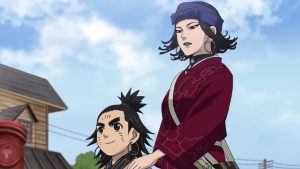 There’s so much that’s right about the flashback story that follows that I hardly know where to begin, so it’s a good thing it so eloquently speaks for itself. The tale of Tanigaki and Kenkichi (Sasaki Tetsuo) is like an epic drama condensed down into 15 minutes of raw emotion – a war story, a romance, a family tragedy, a tale of betrayal and redemption. It’s truly wonderful, right down to its final moments on the horrendous battlefield at Port Arthur.
There’s so much that’s right about the flashback story that follows that I hardly know where to begin, so it’s a good thing it so eloquently speaks for itself. The tale of Tanigaki and Kenkichi (Sasaki Tetsuo) is like an epic drama condensed down into 15 minutes of raw emotion – a war story, a romance, a family tragedy, a tale of betrayal and redemption. It’s truly wonderful, right down to its final moments on the horrendous battlefield at Port Arthur.
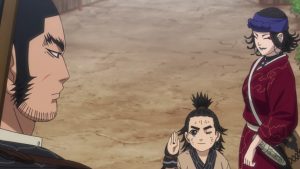 But not to be overlooked are the small nuances – like the role of Lt. Tsurumi in this story. He’s an odd figure, a devil in many ways, but also a formidable man not to be overlooked. That he’s cunning and relentless is obvious, but he’s also a leader with enormous charisma – that’s why his men are as fiercely loyal to him as they are. We’ve seen Tsurumi jovial and entertaining, but we’ve never seen him quite like this – it’s obvious he represented something of a father figure to the lost boy Tanigaki in those months before the main story began. Not only does he shut up and listen to Tanigaki’s tale and say all the right things when he does rarely speak (right down to his request to taste Akita kanemochi with walnuts) it seems for all the world to be totally genuine – the actions of a caring mentor looking out for a younger comrade.
But not to be overlooked are the small nuances – like the role of Lt. Tsurumi in this story. He’s an odd figure, a devil in many ways, but also a formidable man not to be overlooked. That he’s cunning and relentless is obvious, but he’s also a leader with enormous charisma – that’s why his men are as fiercely loyal to him as they are. We’ve seen Tsurumi jovial and entertaining, but we’ve never seen him quite like this – it’s obvious he represented something of a father figure to the lost boy Tanigaki in those months before the main story began. Not only does he shut up and listen to Tanigaki’s tale and say all the right things when he does rarely speak (right down to his request to taste Akita kanemochi with walnuts) it seems for all the world to be totally genuine – the actions of a caring mentor looking out for a younger comrade.
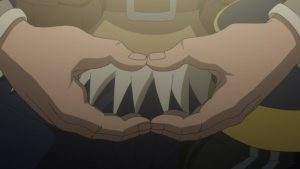 That’s Golden Kamuy in a nutshell, a world where people refuse to be easily categorized and motives are never simple or clear-cut. And is if all that weren’t enough, the episode closes with a hauntingly beautiful scene where Asirpa does the Sarorunrimse (a crane dance from Kushiro) just as Tanigaki, Cikapasi and Inkarmat catch up to them. What are Sugimoto’s thoughts as he watches her – and Ogata’s as he watches him do so? There’s so much subtlety and nuance in this story that’s easy to lose sight of when it’s at its most bombastic, but episodes like this one are a powerful reminder that the emotional wellspring of Golden Kamuy runs very deep indeed.
That’s Golden Kamuy in a nutshell, a world where people refuse to be easily categorized and motives are never simple or clear-cut. And is if all that weren’t enough, the episode closes with a hauntingly beautiful scene where Asirpa does the Sarorunrimse (a crane dance from Kushiro) just as Tanigaki, Cikapasi and Inkarmat catch up to them. What are Sugimoto’s thoughts as he watches her – and Ogata’s as he watches him do so? There’s so much subtlety and nuance in this story that’s easy to lose sight of when it’s at its most bombastic, but episodes like this one are a powerful reminder that the emotional wellspring of Golden Kamuy runs very deep indeed.


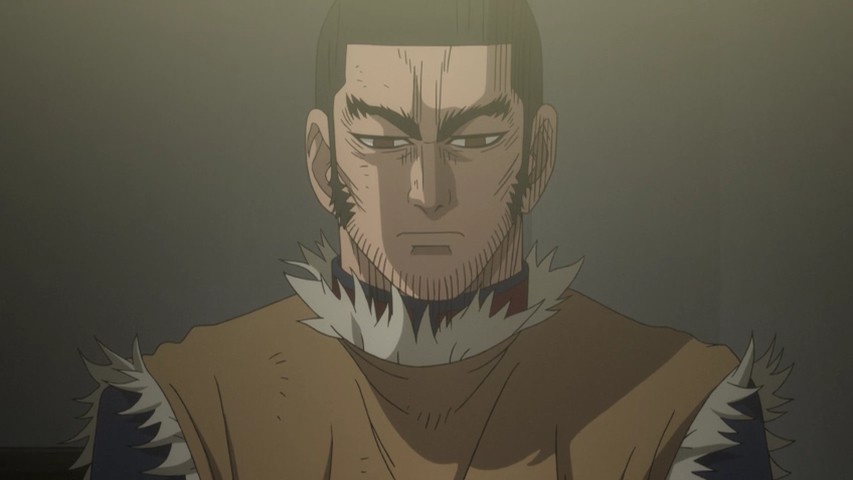
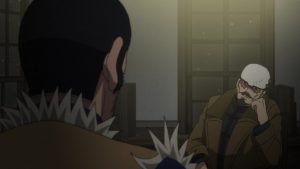
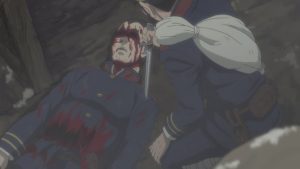
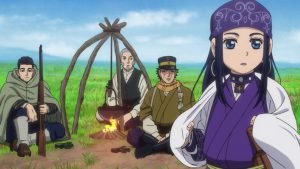

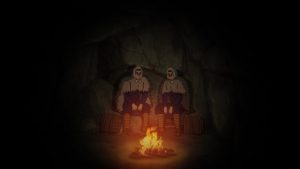
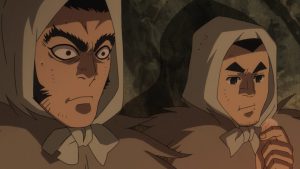

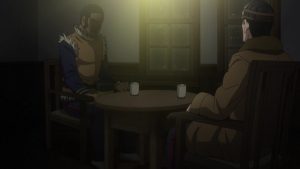
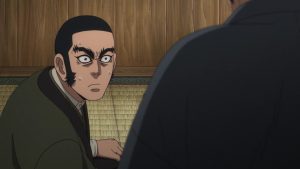
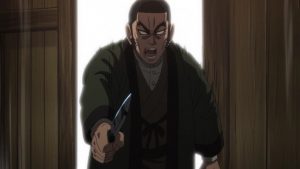
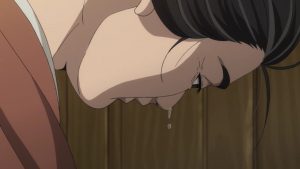

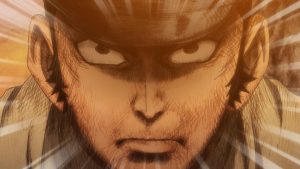
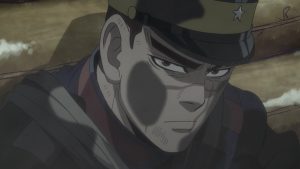
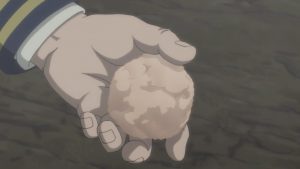
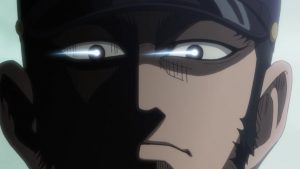

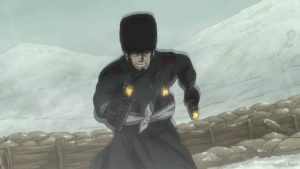

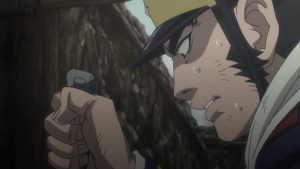
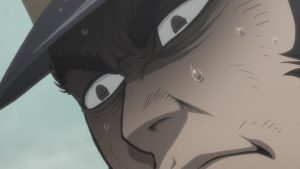
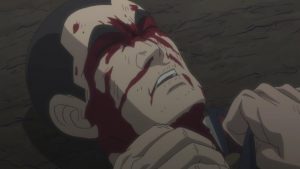
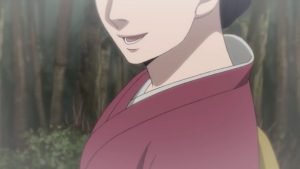
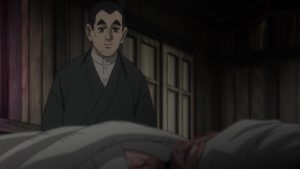

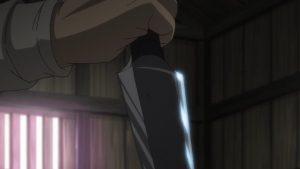

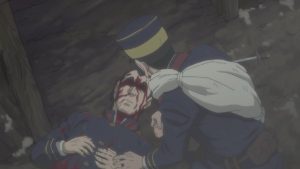
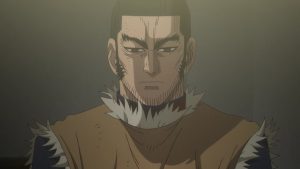
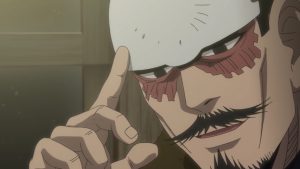

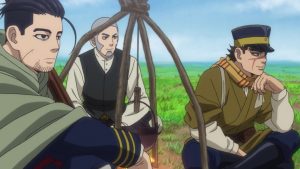
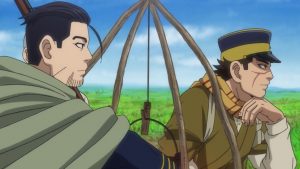

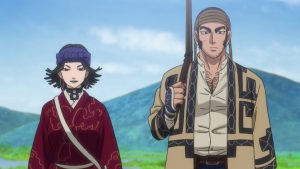



Yukie
November 13, 2018 at 11:22 pmI was taken by surprise by this episode, didn’t think we’d be getting an entire episode on Tanigaki, but it was really beautifully executed.
After last episode and this episode, I’m once again amazed by the effort these seiyuus put to master the regional dialects on top of the Ainu language (whether they’re accurate or not I cannot tell, but Tanigaki’s sounds close to the Tohoku-ben I’ve heard before).
I think we’re seeing a pattern with Tsurumi here, starting with Edogai-kun, Koito, and this time Tanigaki…I think you’re quite right that for these lost and broken men he’s very similar to a father figure.
Marty
November 14, 2018 at 3:45 amI cannot think of another show this year, besides Boku no Hero Academia, that’s had this much consistency in these many episodes. I don’t think Golden Kamuy has had a single misstep yet, which is admirable in its own right.
Honestly, if the manga was a little more faithfully adapted (my biggest issue is the censorship) and better animated (specially, but not limited to, CGI wildlife), I genuinely think it would be my definitive candidate for Anime of the Year.
Looking back at it, it’s no wonder the manga is so well awarded.